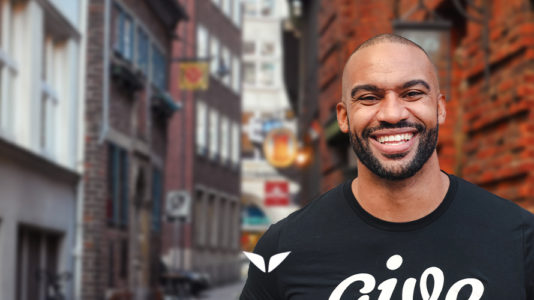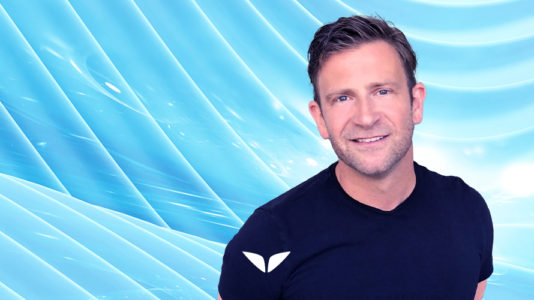Hi, I’m Vishen Lakhiani, founder of Mindvalley, the school for human transformation. You’re listening to the “Mindvalley Podcast,” where we will bringing you the greatest teachers and thought leaders on the planet to discuss the world’s most powerful ideas on personal growth for mind, body, spirit, and work. I’m Vishen Lakhiani, and this is the “Mindvalley Podcast.”
So the big problem in life in industrialized countries is that all too often we wake up one day at the age of 40 dreading going to work because we were forced to pick a career before we could legally buy a beer. And why does this happen? It’s because so many of us in our younger years think that a mean score is really an end goal. We confuse the two, and both of these things are really, really, really different. And this is one of the lessons I wish more people could learn early in life, the difference between an end goal and a mean score.
Now end goals, end goals are beautiful. End goals are the end result of being human. End goals are about experiencing love, traveling around the world, being truly happy, contributing to the planet, learning a new skill. Mean scores are the stuff that society tells us we need to have in place to get to happiness. For example, getting a good GPA, getting into college, getting into a particular firm, being with one particular someone, getting a good review at work. The problem is we get so obsessed over these mean scores that we lose sight of the end goals. For example, when I was younger, in the early ’90s, I had a goal, and that goal was to graduate from a good college and get a job at the leading software at the time, Microsoft. And I accomplished that goal after five years of slogging it out, senior high school, and then university I finally ended up at Microsoft. And 11 weeks later, I realized I absolutely hated my job and I actually got myself fired. Why? Because I confused a mean score with an end goal.
Now what did I really want? What I really wanted was to travel around the world, to have my own business, to have the freedom to what I wanted to do. I simply thought that the only way to afford all these things would be to become a software engineer and slog it out for 20 years doing something I really didn’t like, programming, to get there. I confused the mean score with the end goal. All of us make that mistake. It’s not about law school, it’s not about the GPA, it’s not about doing good in a particular test, it’s about truly experiencing life.
Now if you think about it, all of life falls down to three things, and I call these three most important questions. How do we avoid the trap of waking up one day at the age of 40 miserable in life in our job because we made the wrong decision? Well, I found that all end goals fall into three different buckets, and it’s really about experiences, growth, and contribution. I call these the three most important questions, the three most important questions you can ask yourself about, “What do I want to experience out of life before I kick the bucket? How do I want to grow? And what do I want to contribute to the planet?” And why are these important? Well, if you think about the first one, experiences, right? Money, for example, money is a mean score. We don’t really measure ourselves by the size of our bank account, however, we truly live life based on the experiences that money can buy. So money is important.
And let’s think about the other two, growth and contribution. Tony Robbins who is an amazing, amazing speaker and trainer, he said that deep down inside we have two great spiritual needs, the need to grow ourselves and the need to contribute. And everything else just creates happiness. The true fulfillment comes from growth and contribution. Now if you put all of these together, you have those three sections of your life. What do you want to experience? How do you want to grow? How do you want to contribute? Answer these three questions. Forget the mean score, strive for the end, and you’d come up with the most powerful thing you can do in terms of setting goals for your life. And you’ll find, especially at an early age, that you open up yourself to opportunities to go outside the system and to drive at the heart of being happy way faster than ordinary people.
Now, this is such an important exercise that when someone enters my life and we’re about to go into a partnership or a close friendship, I ask them these questions over a drink or…you know, I want to know what drives them? What experience do they seek in life? How do they want to grow? How do they want to contribute to the planet? But I believe in these questions so much that I even made this part of our company, Mindvalley. So every new person who joins Mindvalley, we take them through an exercise where they answer these questions. And we collect all of these in a piece of paper, we stick their face on it, and all of these pieces of paper go on what is perhaps one of the biggest done vision boards on the planet. And this is such a beautiful practice because you know exactly what drives your co-worker, what drives your employee. If you’re a manager, you know exactly what are the motivations and the drives of the people under you just by looking at the answers to their three most important questions. It’s a blueprint into their soul. So I totally recommend this for anyone who is running an organization, but for now we’re gonna do this with you.
So what I’m gonna do over here is I’m gonna show you, I’m gonna help you come up with the answers to these three questions. We’re gonna do this in the form of the speed round. A lot of people over complicate the process, but really all you need is an iPhone, any kind of stopwatch, and 90 seconds for a question. What I’m gonna ask you to do is I’m gonna set a timer and in 90 seconds you’re gonna answer each of these three questions. And don’t worry about overthinking it through. Just let it flow. The reason we use a timer is because it helps you shut down your logical mind so that your creative right brain can just help these answers flow through you. So grab a pen and a paper, or if you’re reading this on my blog, there’s a sheet you can download, a PDF sheet that’s already prepared for this. Go ahead and download that and we’re going to get started. Make sure it’s printed out.
So we’re gonna start with the first question. And that first question is, I want to make a list of all the experiences you want to get out of life so that on the day, you know, your final day, you know that you truly lived life. So make a list of all the experiences. We’ve started the timer at this point. And as you’re making this list, I’m gonna speak out several phrases and ideas that might help you complete your list. So make that list. What would you really want to experience? Think about people you know who have done incredible things, seen amazing places, traveled around the world. Don’t make money or time an option. So think, “What would I experience if time and money were no question?”
Expand it to include health and fitness. Think about love, relationships, sexuality. If you’re a parent, think about experiences with your family, with your child. Think about your friends and your social life. What experiences would you share with these friends? Remember, don’t worry about what money can buy. Assume that you have unlimited access to funds or that you’re going to win these opportunities. You can extend this to places. What type of car would you want to drive? What type of home would you want to live in? Where would you spend your holidays? Who would you spend them with? And you have five seconds left. And that’s it. Easy, wasn’t it?
And now we’re going to the second question, growth. So I believe that we truly become fulfilled when we grow ourselves. I personally think that all of us were born, and part of our purpose in life is to learn new skills, to develop ourselves as human beings, to embrace personal growth. So what we’re gonna do now is make a list in 90 seconds of all the various ways you might want to grow and be a more creative human being. So ready, start, let’s begin. So think about your intellectual life. What books would you want to read? What skills would you want to learn? Think about travel. What languages might you want to master?
And let’s extend beyond intellectual life. Think about character traits, leadership, honesty, confidence. What character trait would you want to bring into your life? Think about emotional intelligence, the ability to control how you perceive the world, the ability to deal with stressful situations in a positive way or positive stamina. Which of those traits would you like to bring into your life? Think about your spiritual life, your meditation practice, prayer, your beliefs. What aspect of your spiritual life would you want to grow? Keep writing, just let it flow through you. Don’t forget to bring in your health and fitness too. What would be your targets or your goals for health? Have you ever dreamed of hiking up Mt. Kilimanjaro or running a marathon, or even something smaller like just having a regular gym practice? And you have five seconds left. That’s it. Put down your pens.
So now we’re gonna go on to the final question, and that final question is contribution. I’m gonna start the timer. And here you’re gonna make a list of all the various ways you want to contribute to the world. Now I’m not saying that the purpose of life is to give. But what I’ve just generally found is that no matter how shitty your life might be, when you think contribution, when you think about giving back, for some inexplicable reason, life seems to give you more as well, and it tends to be one of the surest paths to happiness. So no matter what you may be going through in life right now, let’s just, for the sake of experiment, make a list on how you might want to contribute to the planet. So I’ve started the timer.
So here are the things to think about. How could you go contribute to your family, to your friends, your workplace? But go beyond that, your city, your society, the world. And your contribution doesn’t have to be something big, although it’s wonderful if it is. It could be some volunteer work. It could be teaching kids at school. If you’re an artist or a writer, it could be through a piece of art or work that you create. What we’re talking about here is your legacy. How are you making the world a slightly better place through your creations or through the donation of your time or your money or your specialty knowledge or your love? Your contribution can also come from your career if you’re working for a company that’s doing good for the planet. Or even just a regular company that’s operating as a business and keeping thousands of people employed. How are you contributing to the world by contributing to that company?
Contribution is one of the surest ways to fulfillment. You have five seconds left. That’s it. Put down you pens. So really, that’s the process that we use. That is the Mindvalley way of goal setting. I wanna get everyone who works for me, everyone I know is a friend, to bypass the rules of the industrial age of society, to forget about what society says you gotta do step by step, but to go straight towards that end goal, towards the very essence of being human. And, again, it really is all about three things, experiences, growth, and contribution.
Hope you enjoyed that exercise. I’d love to have you share a comment below or to forward this to a friend whom you think might benefit from this. Leave a comment below. Let us know what ideas you came up with, because here is the beauty of these exercises. We inspire each other. As you read the comments below, you might see someone else’s ideas about growth, and contribution, and experiences, and you may go, “Aha, I wanna do that too.” So as you share this, you’re inspiring other people to add to their end goal list. So go ahead and leave a comment below. Don’t forget to share it with a friend or to anyone whom you feel might benefit from this and who might be able to be plucked out of being in that trap for falling for mean scores and pushing back their happiness. Thank you. This is Vishen Lakhiani, and thanks for joining us.




